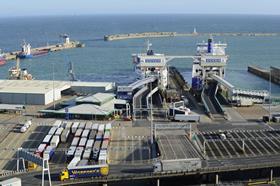
Freight volumes through the Port of Dover reached record levels for the fifth consecutive year in 2017, the south coast gateway has announced.
The port handled over 2.6 million lorries in 2017 – an increase of almost 10,000 on the previous year. This brings the total increase over the last five years to just under 650,000 units or 33 per cent.
According to chief executive Tim Waggott, this sustained growth is proof that Dover continues to be the port of choice for hauliers travelling to and from Europe – the UK’s largest trading partner.
Waggot added that the figures also underline the need for a post-Brexit trade deal that ensures continued traffic fluidity at the port, which handles up to 17 per cent of the UK’s entire trade in goods. The port estimated that these goods were worth up to £122 billion in 2017.
The facility stressed that as Europe’s busiest ferry port, “there remains no substitutable capacity elsewhere in the UK to handle Dover’s trade volumes”.
Waggott said: “We offer supply chains the shortest sea crossing between the UK and the continent and, as such, will continue to be the most efficient strategic choice for hauliers.
“With Brexit talks about to move on to trade, it is essential that all sides commit to the right solution to ensure fluidity at Dover and the wider trade corridor along with a more resilient strategic road network to support it. Jobs and livelihoods depend on it.”
One of the UK’s largest trade associations, the Freight Transport Association (FTA), echoed Waggott’s calls. Its chief executive James Hookham said: “The ease with which vehicles and their loads can pass through Dover and the French ports will be a big test of the post-Brexit arrangement.
“With Ro-Ro traffic growing at the current rates, getting clarification on how any future customs procedures at Dover and elsewhere will work is the top priority for European logistics and supply chain managers in 2018.”
Across the Channel in France, Jean-Marc Puissesseau, president-general manager of Port Boulogne Calais, added his support for fluid trade after Brexit.
He said: “Like the Port of Dover, the Port of Calais is expecting to confirm record freight traffic this year, with two million heavy goods vehicles passing through in 2017.
“Forecast growth in freight traffic on both sides of the Channel in the coming years proves that the Calais-Dover route, the shortest and most economical route, remains a strategic choice for the transport and logistics industry.”



